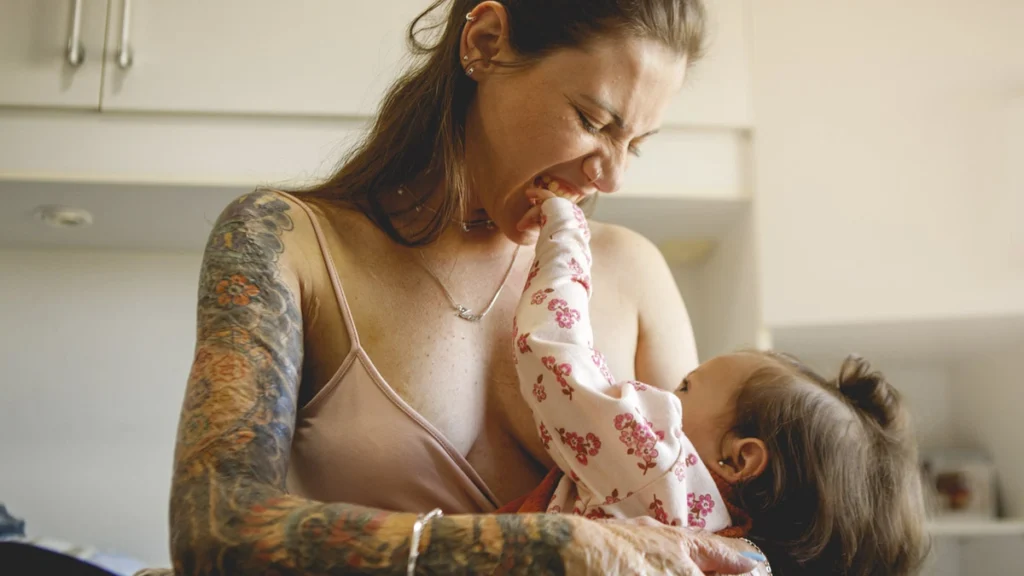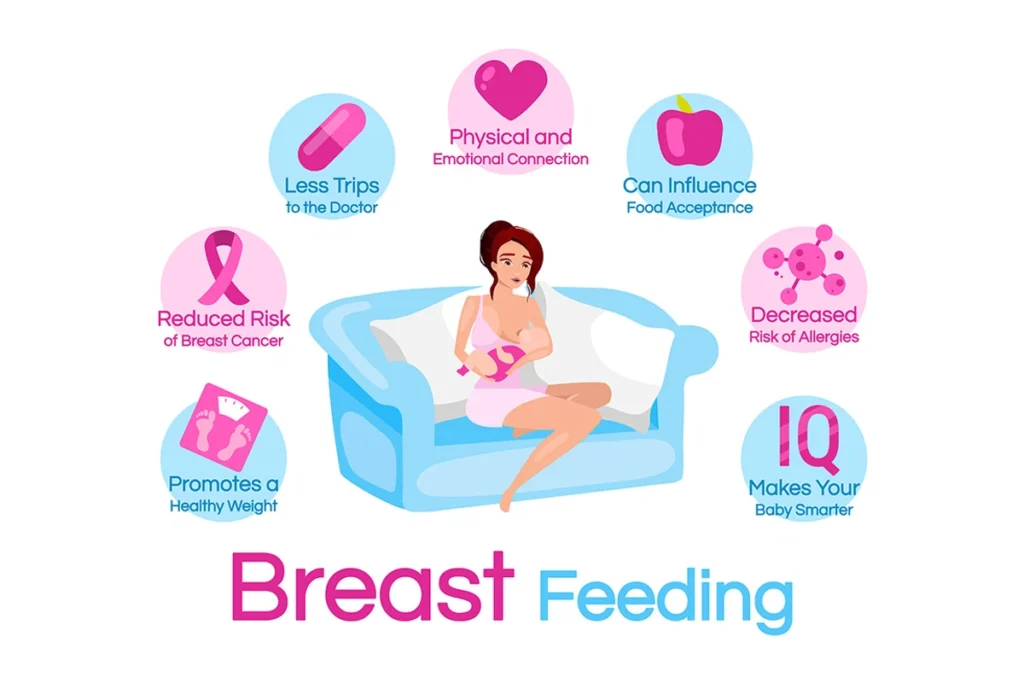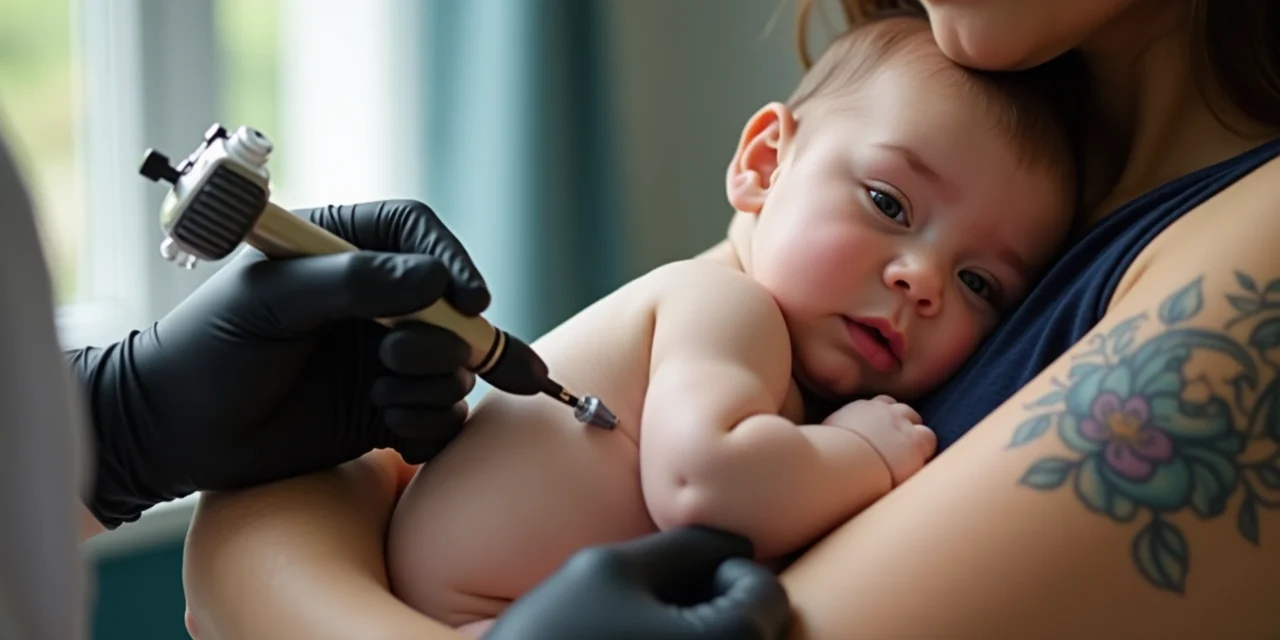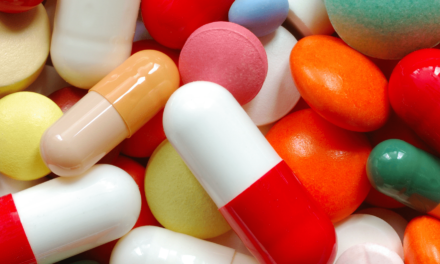Many new mothers wonder about getting tattoos while breastfeeding. The question makes sense, given that more than half of Americans under 40 have tattoos, and many sport multiple designs. The popularity of body art keeps rising, with over 30% of Americans having at least one tattoo.
The desire to get inked might be strong, but health considerations should come first. Most tattoo artists refuse to work on pregnant or breastfeeding mothers. Scientists believe that ink molecules are too big to enter breastmilk. The real worry isn’t about the ink.
Can You Get Tattoos While Breastfeeding & Risk Factor
The main risks come from possible infections that could cause serious health issues like tetanus, hepatitis, and HIV. The lack of federal regulation in the American tattoo industry adds to these concerns. The Food & Drug Administration hasn’t approved tattoo pigments yet.
This piece looks at what medical research reveals about tattoos during breastfeeding. You’ll find facts backed by science rather than rumors to help you make the right choice.
What Experts Say About Tattoos and Breastfeeding

Medical professionals face their biggest problem with tattoos and breastfeeding. They don’t have enough scientific evidence to make solid recommendations.
Lack of conclusive research
The facts are simple – we don’t have enough research about getting tattoos during breastfeeding. LactMed, a trusted database from the National Library of Medicine, clearly states that “no data are available on the safety of tattooing during breastfeeding“. This makes it hard for healthcare providers to give advice to new mothers who want tattoos.
The Australian Breastfeeding Association also points out this gap in research. They note that “there isn’t very much research about the safety of tattooing during breastfeeding”.
Yet “no negative impacts to babies have been reported after a mother has received a tattoo when breastfeeding”. The lack of reported problems doesn’t prove it’s safe, but it helps explain why experts take such careful steps.
Why caution is advised
Healthcare professionals usually tell mothers to wait until they finish breastfeeding before getting tattoos. They worry about possible risks rather than actual cases of harm.
The biggest worry is infection. Dr. Jessica Madden, pediatrician and medical director of Aeroflow Breastpumps, says “the main risk of getting a tattoo while breastfeeding is of infection”.
These infections could pass to your baby through breast milk or skin contact, especially if you have cracked nipples.
Experts also worry about what’s in tattoo ink. These inks have “many different colorants, additives and impurities” that weren’t made for tattoos, and most are “not authorized for use in cosmetic products”. New research from 2022 shows that “tattoo ink contains extremely small particles that are less than 100 nanometers.” These particles are “tiny enough to get into body cell membranes” and might affect breast milk.
La Leche League International suggests mothers should wait “at least until 9-12 months after birth, when the child is no longer dependent solely on breastmilk before getting a tattoo”.
Statements from medical organizations
Medical organizations play it safe with their official advice. La Leche League International believes that “it is generally assumed that ink molecules are too large to pass into breastmilk during the tattoo process”. They still recommend waiting because “it is unknown whether the inks used may pass into breastmilk”.
LactMed mentions that “theoretical concerns relate to transmission of pigments or infections to the infant during breastfeeding”. Their experts think it’s better not to get new tattoos while breastfeeding.
Kristin Cohen, a certified nurse-midwife, recommends “waiting until the baby has weaned out of an abundance of caution regarding the potential risk of infection that could be transmitted in breast milk and the unknown effects of tattoo ink on breast milk”.
Most good tattoo studios won’t work with breastfeeding mothers. A BabyCenter Community member points out, “Pretty much any reputable shop won’t tattoo a pregnant woman,” and this rule often includes breastfeeding mothers “mostly for liability reasons”.
Risks of Getting a Tattoo While Breastfeeding
Nursing mothers who want tattoos should understand the health risks involved. Many moms feel eager to express themselves through body art after pregnancy, but they need to assess certain medical factors first.
Infection and disease transmission
The biggest problem with getting tattoos during lactation is the risk of infection. Tattooing creates “a substantial shallow wound on the body” that needs strict hygiene measures to prevent complications. You should know about two types of infections:
- Local infections happen when proper aftercare routines aren’t followed – like cleaning with mild soap and water, not picking scabs, and protecting the tattoo from sun exposure
- Systemic infections occur when tattoo artists don’t follow universal safety measures with sterilized equipment
These infections can harm your nursing child. Systemic infections might include dangerous conditions like tetanus, hepatitis B, hepatitis C, HIV, and methicillin-resistant staphylococcus aureus (MRSA). Your doctor might need to prescribe medications that aren’t safe while breastfeeding if complications develop.
Blood banks and human milk banks won’t accept donations until 4-12 months after getting a tattoo. This cautious approach shows the medical community’s concern about transmission risks.
Allergic reactions to ink
Allergic reactions pose another substantial risk. Your body might reject tattoo inks, which the U.S. Food and Drug Administration hasn’t regulated or approved for tattooing. These inks contain various materials including heavy metals and chemicals found in printer toner and paint.
Red inks cause allergic reactions more often than other colors. You might notice persistent swelling, itching, and redness where the tattoo is placed. Previous tattoos without problems don’t guarantee you won’t react to new ink.
Your body experiences significant stress during an allergic reaction. Medical professionals advise against this extra strain while breastfeeding. Treatment becomes tricky because some allergy medications aren’t safe during lactation.
Impact of numbing agents like lidocaine
Numbing agents like lidocaine used in tattooing seem safe for nursing mothers. Lidocaine levels in milk stay low across different application methods, and babies don’t absorb much of it.
Research shows that “lidocaine is not expected to cause any adverse effects in breastfed infants” and “no special precautions are required”. Studies found that breastfed babies receive only about 0.9% of the mother’s weight-adjusted lidocaine dose through milk.
You should tell your tattoo artist and healthcare provider that you’re breastfeeding. Dr. Jessica Wu, a dermatologist, says “Be sure to check with your doctor about whether what they’re using is safe, since these typically contain lidocaine and other ingredients that could enter breast milk”. Some numbing products might contain unstudied substances beyond lidocaine.
Most reputable tattoo artists refuse to work on breastfeeding mothers because of these potential complications. You’ll need to weigh these risks carefully against your desire for body art.
Timing and Safety Guidelines
Nursing mothers need to think over timing and safety carefully before getting a tattoo. Many new moms want to express themselves through body art, and proper timing plays a vital role.
When is it safest to get a tattoo?
Medical professionals advise new mothers to wait until they complete their breastfeeding experience. La Leche League International suggests waiting “at least until 9-12 months after birth, when the child is no longer dependent solely on breastmilk before getting a tattoo”. Your body needs this time to heal from childbirth. The timing reduces stress during this significant bonding period.
Tattoo professionals stand firm on these guidelines. “Most tattooists will not knowingly tattoo a pregnant or breastfeeding mother”. They take this position due to liability concerns and health considerations for both mother and baby.
Some sources say you could get inked after waiting until your baby is at least six months old. Your milk supply and breastfeeding routine should be stable by then, which might reduce disruptions during healing.
Why waiting 9–12 months recommend
The 9-12 month waiting period makes sense for several reasons. Your body needs recovery time after pregnancy and childbirth. “After pregnancy, the body needs to heal,” notes Dr. Friedler. Pregnancy changes your skin dramatically, and it takes time to return to normal.
Your immune system grows stronger during this period, which reduces infection risks and helps better healing. “If you’re run down from the pregnancy & breastfeeding, your tattoo will not heal properly”.
This waiting period matches when most infants start eating solid foods and depend less on breast milk. The timing helps reduce any possible risks from the tattooing process.
Choosing a licensed and hygienic tattoo studio
A reputable tattoo studio becomes your next priority after deciding on timing. Look for places that:
- Use a licensed tattoo facility with properly trained staff
- Employ artists who wear new disposable gloves between clients
- Use needles from sealed containers and new pigment trays
- Have sterilization machines for equipment that cannot be disposed
- Clean surfaces with bleach-based disinfectants
“Blood travels and can contaminate all different types of surfaces,” which makes strict cleanliness standards necessary throughout the studio. Any reputable studio follows universal precautions, including “single-use ink cups, gloves, needles, barrier control over all equipment, and a clean room”.
Getting a tattoo remains your personal choice. These timing and safety guidelines help minimize potential risks. The wait won’t change your desire for self-expression—it will give you peace of mind about your new tattoo.
Tattoo Removal and Breastfeeding: What to Know
Tattoo removal brings different challenges for breastfeeding mothers compared to getting new ink. You need to understand how this process affects your body before making any decisions.
How laser removal affects the body
Laser tattoo removal breaks down ink particles in your skin into smaller fragments. The laser pulses target the tattoo pigment in the dermal layer and shatter the ink. Your body’s immune system sweeps these fragmented particles through your lymphatic system to your liver. The liver then filters them from your body. This process needs 8-10 treatments spaced 4-8 weeks apart. The treatments can cause discomfort, blistering, and sometimes scarring.
Unknowns about ink particle absorption
Nursing mothers face a big challenge due to lack of research. No scientific studies show whether these broken-down ink particles can enter your milk supply. Researchers haven’t even determined if these fragments are small enough to pass into breast milk. This creates a real problem because medical professionals can’t say for sure if these particles might reach your nursing infant.
Why removal should wait until after weaning
Medical experts agree that you should wait until after weaning to remove tattoos. La Leche League International recommends waiting until your child has finished breastfeeding completely before starting laser tattoo removal. Most quality laser tattoo removal clinics won’t treat breastfeeding mothers. They suggest waiting about 3 months after you finish breastfeeding before starting removal sessions.
The reason behind this caution is simple—your child’s safety comes first. Your body goes through major hormonal changes during pregnancy and breastfeeding that affect your skin’s sensitivity and healing ability. Letting your body return to normal after weaning can lead to better results with fewer risks.
Common Questions and Misconceptions

New mothers often wonder about the safety of tattoos while breastfeeding. Let’s address these common concerns with evidence-based answers.
Can you breastfeed if you already have tattoos?
The answer is yes! Your existing tattoos won’t affect breastfeeding at all, as long as they’ve healed completely. The tattoo ink stays in your skin’s dermal layer and doesn’t mix with breast milk. The healing status of your tattoo matters more than its location on your body.
Can you get a tattoo while pregnant?
Healthcare providers recommend waiting until after pregnancy. A medical expert notes, “There’s no data that tattoos during pregnancy are unsafe, but that doesn’t mean they’re completely safe”. The main concerns revolve around infection risks and unknown effects of tattoo inks on developing babies. Most tattoo artists won’t work on pregnant women as a safety measure.
Do tattoos change during breastfeeding?
Changes can happen! Your tattoos might look different because of pregnancy rather than breastfeeding. Hormonal changes can cause conditions like chloasma or melasma, which create darker skin patches and affect how tattoos look. Your tattoos might also stretch or change shape as your body transforms during pregnancy and postpartum periods.
Can you donate milk if you have tattoos?
The answer is yes, with certain conditions. The Human Milk Banking Association of North America allows milk donation from mothers with recent tattoos if they got them at regulated facilities using sterile, single-use needles and dye pots. Some milk banks need a three-month waiting period and blood tests after getting tattooed. You should check your local milk bank’s specific requirements beforehand.
Conclusion
Getting a tattoo while breastfeeding remains a personal choice, though medical evidence suggests taking extra precautions. Medical research offers limited concrete guidance on tattoo safety during nursing. Most healthcare professionals suggest waiting until you’ve finished breastfeeding to get new ink.
Medical experts worry more about infection risks than the tattoo ink itself. The ink particles are likely too large to enter breast milk, but lack of detailed research has led medical organizations to promote waiting. The same applies to tattoo removal – it should wait until after weaning because no one knows how broken-down ink particles might affect your nursing baby.
Your body needs 9-12 months after birth to heal completely, which reduces potential risks for your baby. This waiting time gives you a chance to find a licensed, reputable tattoo studio that follows strict hygiene protocols.
Your existing tattoos won’t harm your breastfeeding baby, even those on your breast. The difference between new and healed tattoos plays a vital role in safety concerns.
Licensed facilities with the core team become even more significant if you decide to get a tattoo while nursing, despite precautionary advice. Your health and your baby’s wellbeing deserve careful thought when making this decision.
A lack of documented harm doesn’t guarantee safety. Most tattoo artists already practice the smartest approach – waiting until you finish breastfeeding before adding new body art. This patience will let you enjoy your self-expression through tattoos without worrying about risks to your nursing child.
Key Takeaways
Medical experts recommend caution when considering tattoos while breastfeeding due to limited research and potential risks to both mother and baby.
• Wait 9-12 months after birth before getting new tattoos to allow your body to heal and reduce baby’s dependency on breast milk exclusively.
• Infection poses the main risk, not the ink itself – serious conditions like hepatitis, HIV, and tetanus can potentially transfer to your baby.
• Existing tattoos are completely safe for breastfeeding – only new tattoos during nursing present potential concerns according to medical research.
• Choose licensed, sterile facilities that follow strict hygiene protocols including single-use needles, disposable gloves, and proper sterilization equipment.
• Postpone tattoo removal until after weaning since broken-down ink particles’ effects on breast milk remain unknown to researchers.
The lack of definitive scientific studies means healthcare providers err on the side of caution, with most reputable tattoo artists refusing to tattoo breastfeeding mothers for liability and safety reasons.





